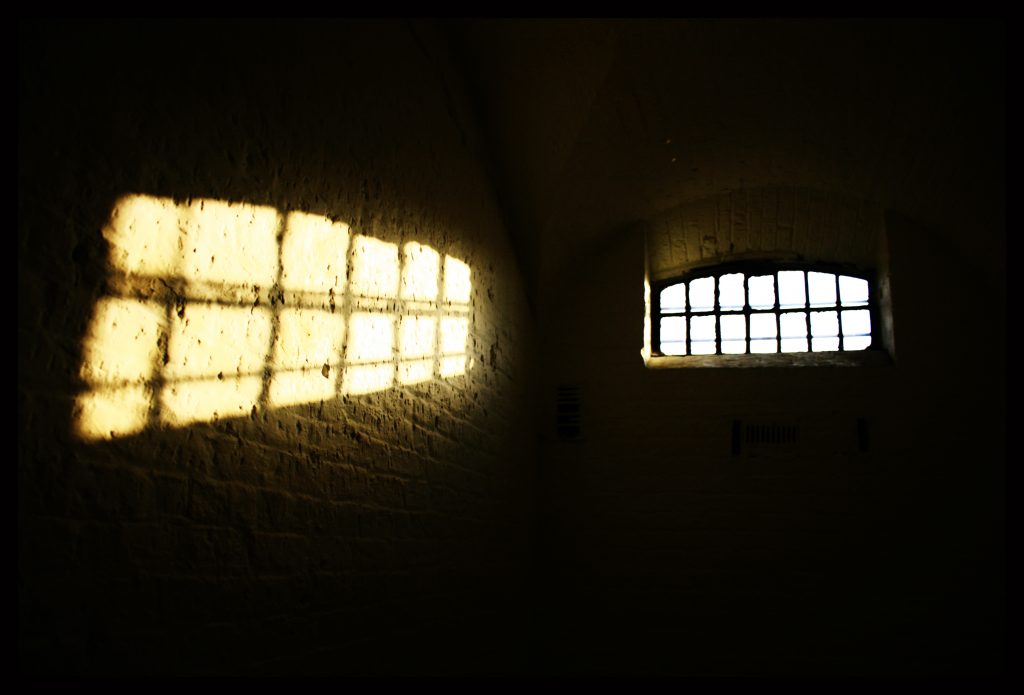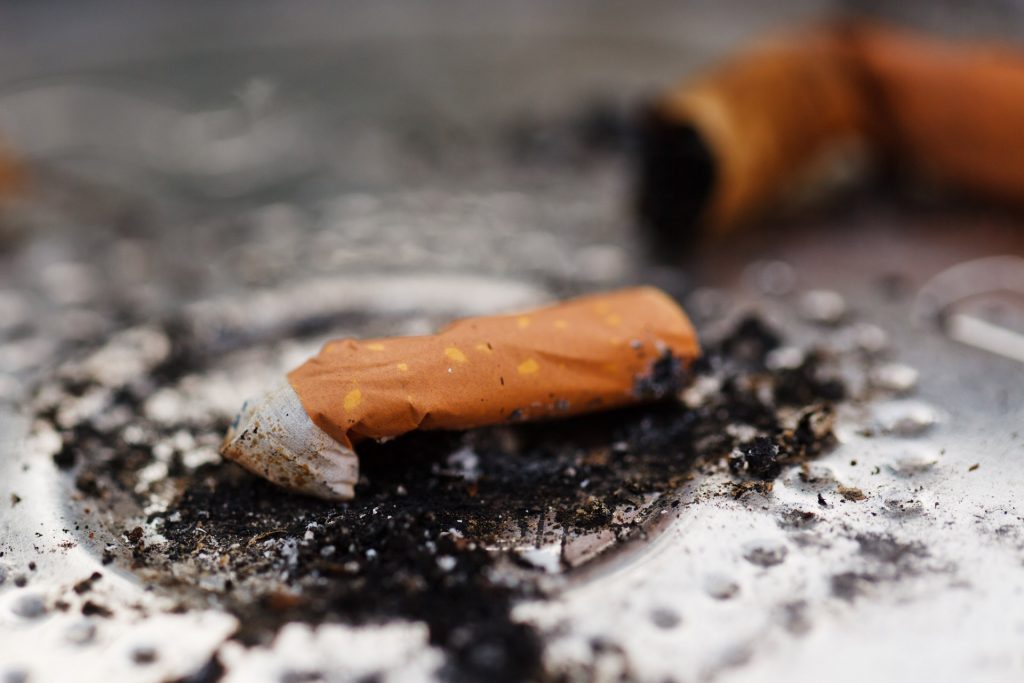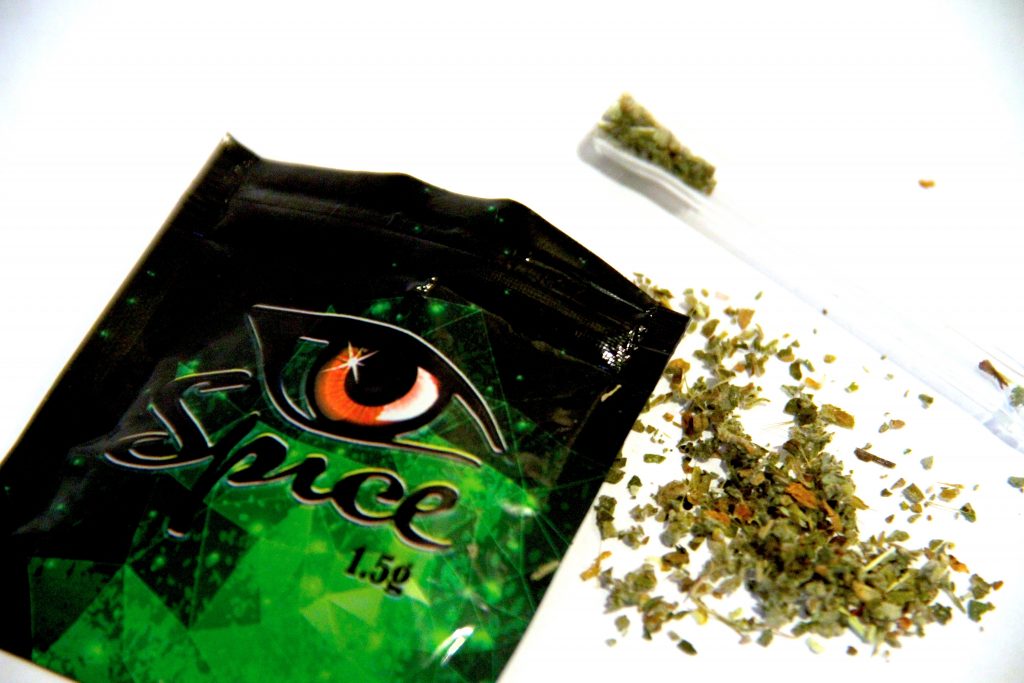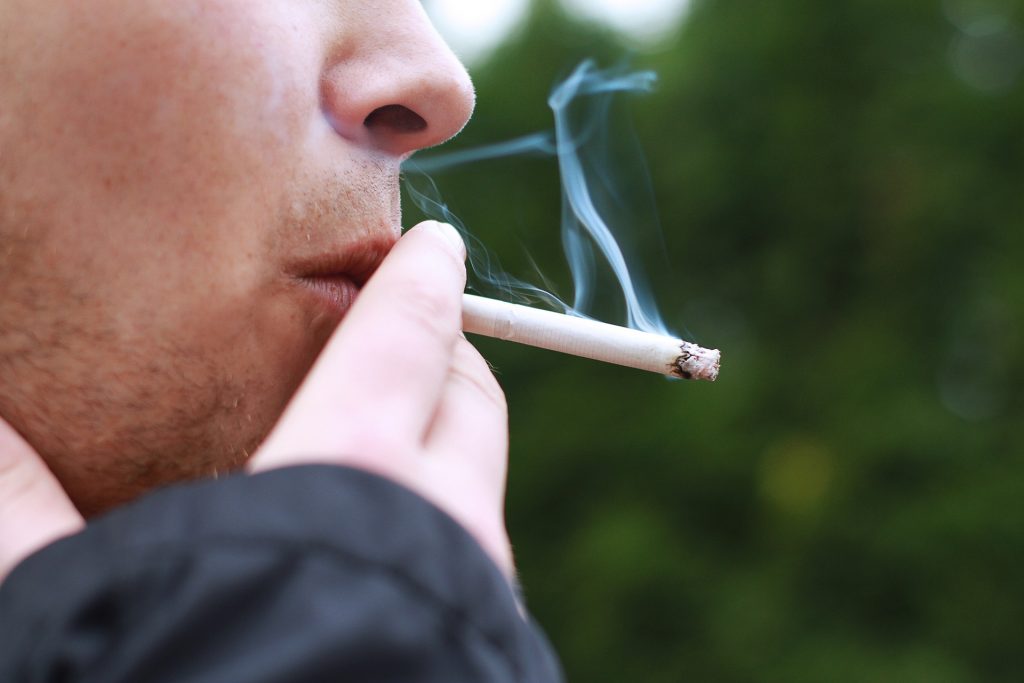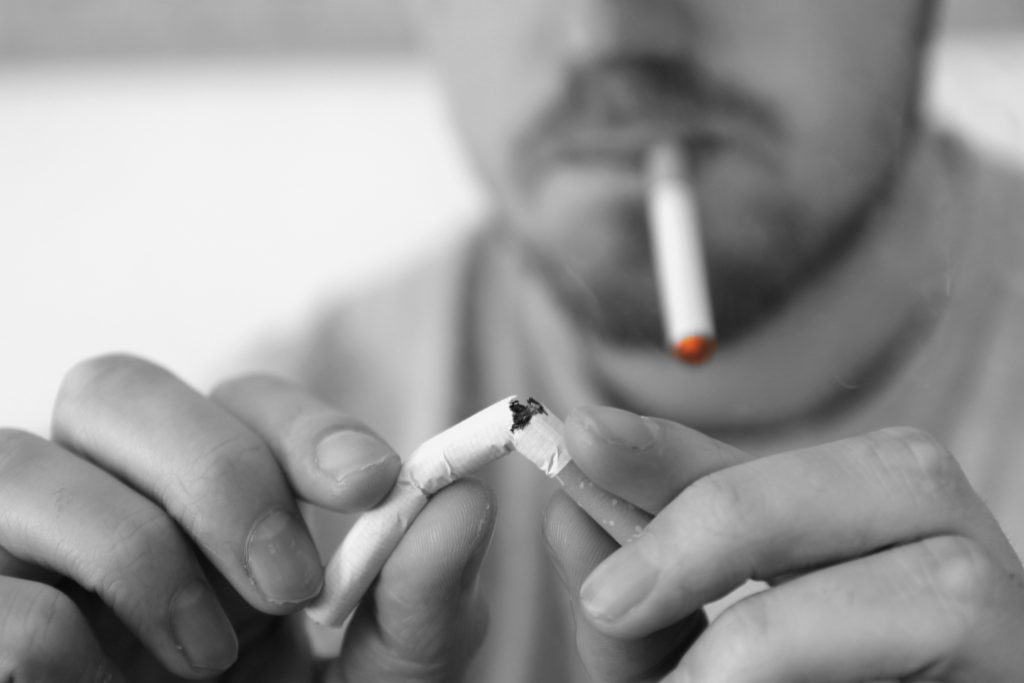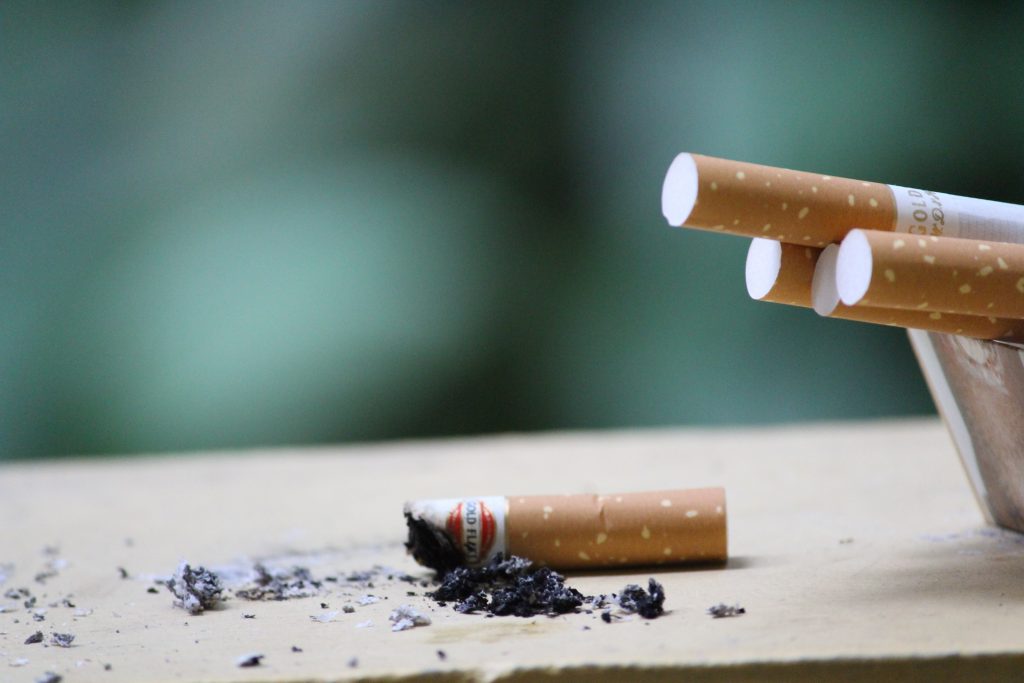“The Government’s campaigns against new psychoactive substances (NPS) and mobile phones being smuggled into prisons have utterly failed. All prisons are completely awash with drugs and mobiles. If they can’t stop mobile phones, cannabis, heroin and NPS getting into prisons, what hope, really, do they have of stopping tobacco?”
Prisoners will stop smoking.
According to a HM Prison Service notice leaked last month, all long-term and high security establishments across the prison estate will become completely smoke-free by August 31.
It is estimated that 80 per cent of prisoners smoke.
Jails were exempted from the 2007 ban that prohibited smoking in all enclosed workplaces in England. So, for the past decade, inmates have been lighting up in their cells.
But, this could now be set to change.
Paul Black, an inmate at HMP Wymott serving an indeterminate sentence, has argued that prison rules are flouted and need to be legally enforceable as prisoners routinely smoke in communal parts of the jail. Although he told the Court of Appeal last year that he had suffered a number of health conditions because of his frequent exposure to second-hand smoke, it ruled that, as premises belonging to the Crown, prisons were exempt from the 2007 ban.
The Supreme Court will hear Black’s appeal in October, on the basis of new evidence from a medical report commissioned by the Ministry of Justice (MoJ) on air quality, which has warned that pollution levels in smoking areas of the prisons studied exceeded World Health Organisation limits and that “second-hand smoke harms everyone”.
In a case of jumping before being pushed, it is understood that the MoJ now wishes all prisons in England to be smoke-free by next spring.
Smoking cessation courses, nicotine patches, vaping devices, information campaigns – all will be available to help prisoners with their lifestyle change. While current prison practice – for non-smoking inmates to be placed wherever practically possible in cells with other non-smokers – will presumably be deemed obsolete. We’re all non-smokers now.
But, will any of this happen, in practice, if a ban is introduced? And why does a ban need to be implemented now?
Our prisons are failing. Overcrowding, understaffing, suicides, self-harm, violence, widespread use of drugs, little time out of cells, a lack of meaningful activities, scarce rehabilitative opportunities, prisoners with serious mental health conditions.
It is difficult to understand how stopping prisoners from smoking can be seen as any sort of priority.
And, yet, the ex-prisoners, prison staff and charities I have spoken to have said that they can understand why it is seen as such – because it is being done for the Government’s own interests, rather than for the prisoners.
The smoking ban is another symptom of the crisis engulfing the prison estate and one which is likely to add fuel to the fire.
Many fear it will, again, highlight the gap between the formal aspirations of what our prisons should be and the reality that lies underneath.
“The pressure for the Government is that, if they don’t do something, the chances are there’ll be further legal action – that, for me, is the driver. For the Prison Service, not to be cynical, it’s not really the health of prisoners that is primarily driving this because our impression was that, prior to these legal cases, this is something that was not seen as a priority.
“When you aren’t offering an awful lot for prisoners and you do just want them to be passive and not cause problems, you might be quite happy to have them smoking.
“They’ve very frightened of compensation claims setting a precedent.”
The Government’s motive for implementing a prison smoking ban isn’t about ensuring ‘equivalence’ of healthcare for those inside prison and out – although this does matter to the Howard League for Penal Reform, Andrew Neilson, its director of campaigns, told me.
For him, the ban is a product of existing pressures on the prison system – first and foremost, overcrowding, which has increasingly resulted in the doubling up of cells.
Despite all best efforts by prison staff not to place non-smoking arrivals with smokers, it is likely that more than a few will still inevitably end up sharing with nicotine addicts.
“If people weren’t being placed in prisons wherever there is a bed available, then you would be able to have prisoners who don’t smoke sharing with other prisoners who don’t smoke and for that to be a planned thing, agreed by the prisoners so no one could complain or take legal action. But, that’s not how people get placed in prisons.
“This is all about the chaotic way our overcrowded system is managed because if it wasn’t like that in the first place, you wouldn’t have this issue of legal challenges, of people who don’t smoke being placed with people who do smoke.”
Mr Neilson believes the ban will be a “risky move”.
“They are trying to introduce this into a system that is grossly overcrowded and where they do still have challenges in terms of staff numbers,” he said. “When you have that backdrop, anything is difficult to manage, let alone introducing smoke-free prisons. When you don’t have the staff to unlock prisoners and get them to any type of education or work, they’re not going to get them into healthcare or a smoking cessation course.
“Ultimately, whatever the rights and wrongs, when you have a system that is in the state it’s in right now, it is undoubtedly a risky move because the prisons are struggling to even do what they are meant to be doing normally, never mind what they should be doing under a programme of going smoke-free.”
Ex-prisoner-turned-academic Alex Cavendish agrees.
He believes that, although the ban may make the Government appear to be doing something to improve the health of prisoners and, paradoxically, ‘getting tough’ on them, its main driver is the threat of legal action – something he warns may not diminish even if a ban is implemented because of a rise in illicit tobacco markets which is likely to follow.
“The Government’s campaigns against NPS and mobile phones being smuggled into prisons have utterly failed,” he said. “All prisons are completely awash with drugs and mobiles. If they can’t stop mobile phones, cannabis, heroin and NPS getting into prisons, what hope really do they have of stopping tobacco?
“If you try to ban a substance that can be legally purchased and owned outside the prison, you run the risk that people will profiteer. It becomes contraband.”
He said that, traditionally, inmates have bought their own cigarettes or rolling tobacco from the weekly prison canteen or from “tobacco barons” who charge interest in the form of wanting ‘double bubble’ of the same back. This will change.
“It will go from being something that is institutionalised via the prison canteen to something that will morph seamlessly into the mainstream drugs trade because the risks will be broadly similar for people smuggling in tobacco, heroin or cocaine.”
He said that once tobacco joins the list of desirable contraband, there will be a rise in the number of prison staff smuggling it in, increased self-harm and the use of other illicit drugs including Spice, and an upsurge in violence – related to debt and prisoner anger.
Mr Cavendish points to the ‘pilot’ prisons – all Welsh jails and four in England – that have been smoke-free since 2016, as evidence of the problems that the ban has caused.
He believes it is to blame for the riot at HMP Erlestoke last May, three weeks after the smoking ban was introduced there, as a result of which 130 prisoners were transferred to other jails.
“The prison had a lot of other problems – it was overcrowded, understaffed, but this was the cherry on top of the cake that triggered anger and the prisoners rioted,” Mr Cavendish added.
The MoJ denied suggestions at the time that the riot was linked to the smoking ban.
Mr Cavendish said he was also concerned by the suicide of 40-year-old Dean George, an inmate at HMP Swansea, last April, three months after the ban was implemented. A partner of another prisoner was reported as saying that he had killed himself “because of the smoking ban – he told the staff he was going to do it”.
This month, Daryl Keenan, a prison officer at HMP Dartmoor, was convicted of smuggling counterfeit tobacco into the jail to sell to inmates. He was arrested in October last year, seven months after the ban was introduced. A victim impact statement from the prison’s head of security and operations noted that the prison had become tobacco-free and said that intelligence suggested that a single cigarette was changing hands for £3.
“The introduction of smoke-free prisons in March 2016 has seen a rise of use of tobacco, which has increased incidents dramatically and causing a major issue for staff and prisoners,” he said.
For Mr Cavendish, all of these are warning signs for the Government of the dangerous, unintended consequences a ban can have.
“Once prisons are non-smoking, everybody will be put down as a ‘non-smoker’, but that doesn’t mean that prisoners won’t smoke. So, if you’re put with someone who is smoking illicitly you’re stuck with it. Prisoners will end up sharing unwillingly with someone who is a covert smoker and they will not dare to report that fact. At the moment, they’re in a position to say, ‘can I share with a non-smoker?’. Non-smokers could well end up in a much more threatening and vulnerable position than they currently have, and they haven’t really thought of that.
“People who take quite an extremist view on health interventions don’t look at the full picture. Other problems that arise as a result of a ban are ignored. They don’t want to acknowledge that this is not a perfect world and simply by saying to prisoners ‘it will be better for your health not to smoke’, that they won’t do it. These are people who are cutting their own bodies in order to get a sense of control, suffering from horrendous mental health problems which are totally unaddressed in prisons.”
Demand for a substance cannot simply be legislated out of existence – especially when so many other underlying problems with our prisons mean inmates are looking for ways to calm themselves down or make them forget.
“They would be much better advised if they were looking at issues of overcrowding and under-staffing and the lack of support for serious mental health problems,” Mr Cavendish added. “If they were dealing with those issues then, it might be possible, once you’ve re-stabilised the prison system and brought down the rates of suicide and self-harm and the appalling levels of violence, to set targets for smoking cessation. And, rather than approaching it from a punitive point of view, offering incentives to prisoners who are willing to kick smoking in their own interest.
“Prisoners will see this as entirely punitive. To deprive 80 per cent of prisoners at the stroke of a pen of the one legal stimulant still open to them is to completely misunderstand how our prisons are run.”
Reports covering how the smoking ban has gone at the ‘pilot’ prisons, published by their Independent Monitoring Boards – groups of laymen and women charged with assessing conditions inside jails – give a mixed picture, but do reveal some worrying insights.
The report for HMP Cardiff notes that “there is anecdotal evidence that the smoking ban and an increase in the use of illicit substances is a contributory factor in the increase of violent and disruptive behaviour”. While the ban was “well managed”, “it does appear to also have contributed to an increase in the use of other substances” including other illicit drugs as well as tea mixed with shredded nicotine patches. “Electrical appliances such as kettles are being dismantled to create flames to light improvised cigarettes.”
At HMP Swansea, “implementation was well planned and organised”, with smoking cessation classes, patches, vapes, ‘champions’, positive education and information campaigns. But, “there is no doubt that the introduction and maintenance of the policy remains a significant challenge”.
The ban was hailed as a “major achievement” at HMP Exeter by the Chief Inspector of Prisons, but he noted that “some prisoners were scraping the film from nicotine patches and mixing them with tea leaves to smoke” and that some prisoners who had stopped smoking started again on release.
HMP Channings Wood saw an increase in self-harm incidents and it was “suggested that this may be linked to nicotine withdrawal”.
The IMB report stated: “The smoking ban has, in itself, not had the negative impact that was anticipated. It probably features in some eruptions of violence and there is a perception that it may have had led to incidences of extremely low mood and acts of self-harm… The brewing of hooch has greatly increased – 66 litres were discovered in one month alone. All discoveries led to adjudications and a total of 245 days have been added to sentences this year. Measures to prevent this – sugar being removed from the canteen list and service of fresh fruit at lunch stopped – have been partially successful and the ban on fruit has now been lifted… Bullying, theft of each other’s property and violence have greatly increased.”
At HMP Dartmoor, there was “minor unrest” to begin with, but it was noted that the “smoke-free pilot has been successful”.
But, the report then goes on to state: “Smoke-free seems to have benefited many prisoners and staff. However, the downside was a sharp increase in the usage of NPS, and seemingly also its potency, resulting in near fatal casualties, frequent and costly hospitalisations, increased disturbance and some violent disorder on the wings and potential for staff to experience unfortunate physical side effects due to secondary inhalation.”
So, a ban at HMP Dartmoor to stop prison officers from inhaling second-hand cigarette smoke has instead led to them inhaling more second-hand NPS smoke?
Although higher pay and improved conditions likely feature more prominently on their list of demands than an end to tobacco use, the Prison Officers’ Association (POA) is not complaining – having consistently called for a smoking ban in prisons for the past 10 years.
“It’s not, as they would tell you, to make prisons a healthy work place, it’s because of the fear of prisoners taking legal action against them,” Terry Fullerton, a POA national union official, told me.
“We’ve been pushing for this ban since anti-smoking legislation was brought in in 2007 which excluded prisons and, in effect, made prison officers the only group of workers to have to enter a working environment that had put them in danger of second-hand smoke,” he added.
“You’ve got to provide a healthy workplace for people.”
Yes, but what about the problems it could add to, at a time when prisons are already under such strain?
“As long as the Prison Service provides prisoners with nicotine replacement therapies and ongoing support to help them stop smoking it really shouldn’t be an issue.”
When I asked Mr Fullerton about concerns that an illicit market for tobacco would simply emerge in the wake of a ban, he suggested that this would be an inevitable by-product for prisons to deal with. It wasn’t a reason not to introduce a ban.
“It may create a possible illicit market for tobacco inside prisons but that’s something we have to cope with, there are illicit markets for all sorts of things inside prisons – tobacco will be one of the other things that we have to make sure don’t come into prisons illicitly,” he told me.
But, the problem is that the MoJ isn’t making sure that drugs don’t come into prisons illicitly. Our jails are currently awash with Spice.
And if illicit markets can’t effectively be dealt with, they will have to be tolerated. If this is so, what is the point of introducing the ban to begin with?
“It’s the last bastion,” said The Tartan Con.
“It’s the right of the person to choose how they want to live. How can you stick somebody in jail for the rest of his life and then say ‘by the way, we’re going to extend your life for a further 10 years and make you healthy’?
“Smoking relaxes an individual. It’s not just about having a cigarette, it’s about the whole process of having it. Prisoners still have rights, despite what the country and the Government think.”
I had only been speaking to the ex-prisoner known as The Tartan Con for a few minutes when he said something that, by now, sounded very familiar: “The reason they’re doing it is they’re scared they’re going to get sued. They’re not doing it for any other reason. They’re not doing it to give people healthier lifestyles. If you want to do that, feed them decent food and allow them outside their cells for more than half an hour.”
“In every prison I’ve been in, if the guy doesn’t smoke, they will not stick him with a smoker,” he added. “They’ll find a way around it.”
“With all the stuff that’s going on in prisons right now, this is not the necessary thing to do.”
The former inmate – who is now employed to work with offenders inside prisons – has no doubt that tobacco will become a type of contraband and, while he doesn’t believe it will lead directly to riots, he remains unconvinced as to how it will be enforced. For him, smoke-free wings would be a much better option.
“The governors I know, they’re not supportive of this smoking ban,” he told me. “They are concerned it will cause smuggling, that they’ll have to spend money retraining sniffer dogs. Are you going to search every cell? Enforcing this is nigh on impossible.”
Former prison officer Kim Lennon believes a ban could have feasibly been enforced back in 2007, but not now.
“With the state of how prisons are, this should not be happening. This is at the bottom of the pile” she told me.
“They’ve got one prisoner committing suicide every three days and they’re talking about bringing in a smoking ban?”
Prison officers smuggling in tobacco, inflated prices and bullying will all result, she believes, adding: “Out of all the drugs in prison, tobacco is the most important. It will become high currency.”
Paul Laxton remembers the days in the ‘80s when “prisoners on remand were actually allowed to have a can of beer brought in on visits”.
A former deputy governor, he said that how tobacco is used by prisoners with mental health problems is being overlooked.
“Prisoners are certainly less healthy than the general population and tobacco is one of the issues, but prisoners are less mentally healthy than the rest of the population and tobacco can be a significant crutch in dealing with mental health problems.”
“In the current climate, there are so few staff, prisoners are being confined in cells for a lot longer,” he added. “By banning it, you create a market at hugely inflated prices and there’s the possibility that prisoners will switch away from tobacco to something like Spice.
“You’ve got prisons that are absolutely on a knife-edge as to whether control is lost or not. It’s a small thing that tips prisoners over the edge. Anything that makes their mood worse is not necessarily a very bright thing to do.
“Tobacco is a legal drug outside in the community. There isn’t an obvious reason why it should be banned in prisons.”
Whether more problems will flare up in our prisons if a smoking ban is introduced remains to be seen. At what pace and how the Government decides to implement this tricky policy will be key.
But, the speed with which the Government is willing to act – arguably in its own interests – to implement it shows how action can be taken if the political conviction for it exists.
Meanwhile, the slow steps being taken to address the root causes of the crisis in our prisons pale in comparison.
No matter.
Prisoners will be healthy.
Who said that the tobacco ban is all smoke and mirrors?
Hardeep Matharu is a writer and researcher at Volteface. Tweets @Hardeep_Matharu

